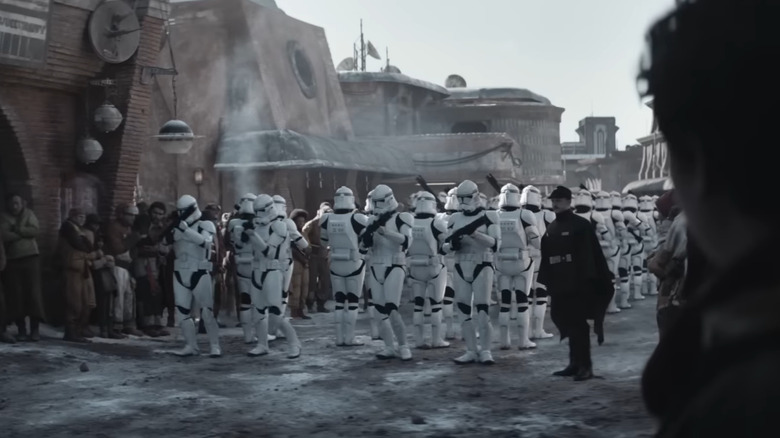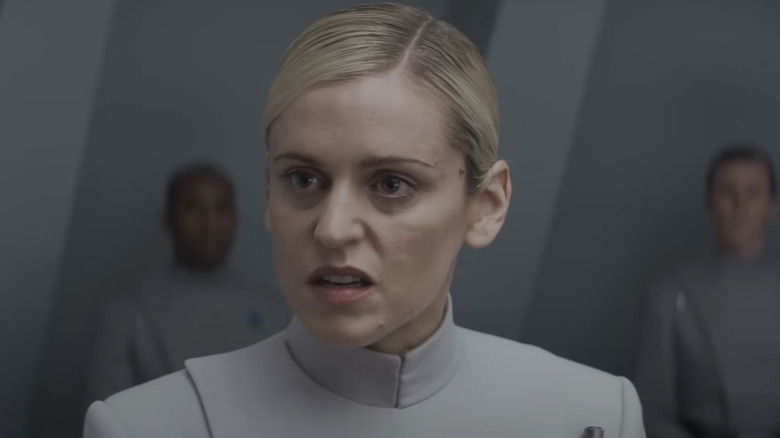Andor's ISB Explained
With the new Disney+ series "Andor," fans are finally getting a look at the Star Wars universe during the darkest hours of the Empire's reign over the galaxy far, far away. The show follows Cassian Andor (Diego Luna) in his journey from nobody to Rebellion hero. Along the way, it shows us some of the Empire's inner workings, including how they enforce their stranglehold on the planets under their rule.
The first few episodes give us a look at the corporate forces of Morlana One, a mining planet under the control of a private company contracted to the Empire. This is a structure that reflects many real-life arrangements between government militaries and private contractors here on Earth. However, these backwater planets are underdeveloped and appear to be of little concern to the Empire. Meanwhile, "Andor" also gives us one of our best looks yet at life in the Imperial core, including the ruling world of Coruscant and the offices of the feared Imperial Security Bureau. There, we follow an ISB agent named Dedra Meero (Denise Gough) as she begins to suspect that Andor may be a bigger player than her Imperial coworkers believe.
While "Andor" may be the best live-action look we've seen of the ISB, the organization has appeared elsewhere in "Star Wars" canon, including in many comics and animated shows. So what, exactly, is this shadowy organization?
The ISB is the Empire's secret police
The ISB, or Imperial Security Bureau, is a law enforcement branch of the Empire tasked with maintaining internal security for the state. Its main job is to seek out enemies of the Empire, including any seditious or rebellious elements, and neutralize them to maintain the Empire's stability. In this way, it resembles something like the former Soviet KGB or even the American FBI. It bears a resemblance to other secret police from fascist regimes throughout real-world history, including the German Gestapo and Italian OVRA during World War II.
As History notes, several shots in the original "Star Wars" trilogy are modeled after imagery from the Nazi propaganda films of Leni Riefenstahl, and George Lucas claims he based the character of Emperor Palpatine on United States president Richard Nixon. Therefore, the ISB reflects a fusion of these governments.
As opposed to the traditional grey uniforms of regular Imperial officers, ISB agents wear stark white or black to signify their elite positions. In fact, a high-ranking ISB agent can override most other Imperial personnel, taking control of Stormtroopers, overriding military decisions, and even commandeering Star Destroyers. This ensures that military officers will remain loyal, as they never know who might be observing them, and ISB agents have the power to subject Imperial officers to on-the-spot inspections.
The ISB is based out of Coruscant, the seat of government for the Galactic Empire, presumably for ease of communication with Emperor Palpatine, to whom they report. Because of this structure, the ISB works with, but not under the Joint Chiefs who we first see in "Star Wars: Episode IV — A New Hope." However, Darth Vader has also been known to command ISB units. In certain "Star Wars" media, including the novel "Tarkin" by James Luceno, the ISB is commanded by Deputy Director Harus Ison.
The ISB is ruthless, even amongst each other
The ISB has strict protocols and hews to the highest standards of Imperial processes. Additionally, they are vehemently xenophobic against non-humans and — although women were known to serve among its ranks — they can come about as a sexist organization. Trainees are ensured to be true believers in the Empire's fascistic ideals through a rigorous process of brainwashing and training.
In "Andor," these characteristics are further developed as ISB agent Dedra Meero comes up against harsh resistance when she attempts to dig further into the matter of a stolen Starpath box recovered from the planet Ferrix in the aftermath of a bungled Corporate Security warrant that resulted in multiple dead Corpos. After finding that the Starpath box was stolen from a sector under her jurisdiction, she is dressed down by her commanding officer for attempting to open her own investigation into the matter. Her methods rely on instinct, whereas the ISB makes decisions on hard evidence and data alone, and she is chastised for her attempts to climb the ladder of command.
Denise Gough has explained her feelings about the character of Dedra Meero, who is a lone woman in the male-dominated ISB. In the context of "Andor," Meero is the character through which the audience experiences the ISB. While Meero may be smarter than many of the men she works with, she's not given the credit she deserves for her insights, something "Andor" implies to be a result of her rookie status and the fact that, as a woman, other ISB agents take her less seriously. At the end of the day, however, Gough is clear that Meero is still a member of a fascist organization, making her an unequivocally evil character.
Additional ISB duties
In the early days of the Empire, the ISB was tasked with uprooting any remaining Separatist factions in the aftermath of the Clone Wars. This included destroying Separatist documents and propaganda, battle droids, and vessels. Other duties were divided among the branches of the ISB, including departments of Surveillance, Investigation, Interrogation, Re-Education, Enforcement, Internal Affairs, Special Operations, and Advanced Weapons Research. Since the organization was focused on internally policing the Empire rather than protecting it from external threats, they also conducted mass surveillance of the Empire's citizens and even monitored communications between Stormtroopers and other military personnel.
Because of their mandate to root out anti-Imperialist sentiment, the ISB was also known to police art and culture, ensuring that no rabble-rousing (or perhaps we should say Rebel-rousing) could come about as a result of subversive music, visual art, literature, and so forth. Regardless of why they were targeted by the ISB, ending up in ISB custody meant either being re-educated or interrogated and tortured to reveal information. Many of those interrogated were never seen again.
"Andor" provides us with the best look yet at this secretive but powerful branch of the Empire, and in the weeks ahead, we may learn even more information about the Imperial Security Bureau from Disney's latest "Star Wars" television show. New episodes of "Andor" air Wednesdays, exclusively on Disney+.



